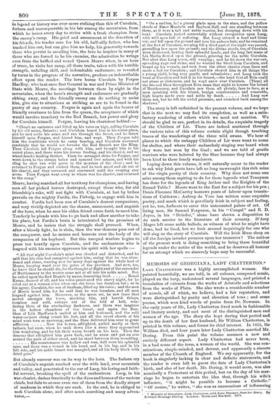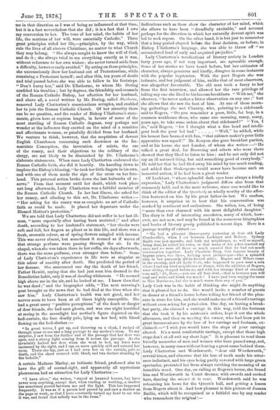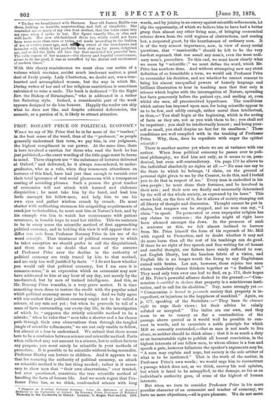MEMOIRS OF GEORGIAN A., LADY CHATTERTON.*
LADY CHATTERTON was a highly accomplished woman. She painted beautifully, we are told, in oil colours, composed music, played on the harp, understood several languages, and printed a translation of extracts from the works of Aristotle and selections from the works of Plato. She also wrote a considerable number of novels, all of which, we believe, had a fair reputation, and were distinguished by purity and elevation of tone ; and some poems, which won kind words of praise from Dr. Newman. In the early years of life, Lady Chatterton lived much in fashionable and literary society, and met most of the distinguished men and women of the age. The diary she kept during that period and up to the death of her first husband, Sir William Chatterton, is printed in this volume, and forms its chief interest. In 1855, Sir William died, and four years later Lady Chatterton married Mr. Dering. From this point the volume assumes a new and entirely different aspect. Lady Chatterton had never been, in a bad sense of the term, a woman of the world. She was con- scientious, simple-minded, and devout, and apparently a sincere member of the Church of England. We say apparently, for the book is singularly lacking in clear and definite statements, and the reader is even left to guess the date of Lady Chatterton's birth, and also of her death. Mr. Dering, it would seem, was also nominally a Protestant at this period, but on the day of his mar- riage he began to entertain the idea that, through his wife's influence, "it might be possible to become a Catholic." " Of course," he writes, " she was as unconscious of influencing • Memoirs of Georgian, Lady Chatterton, with flame Passages from her Diary. By Edward Heneage Dering. London: Hurst and Blackett. 1873.
me in that direction as I was of being so influenced at that time,
but it is a fact nevertheless that she did ; it is a fact that I owe my conversion to her. The tone of her mind, the habits of her
life, the motions of her will, were essentially Catholic." Three great principles ruled her life,—principles, by the way, which rule the lives of all sincere Christians, no matter to what Church they may belong. " She always sought to know the will of God, and do it ; she always tried to see everything exactly as it was,
without reference to her own wishes ; she never turned aside from a difficulty, however easily avoided." By acting on these principles,
she unconsciously drew her husband out of Protestantism, while remaining a Protestant herself ; and after this, ten years of doubt and trial passed before she was able to follow in his footsteps. " Don't hurry her," said Dr. Ullathorne, to whom Mr. Dering confided his troubles ; but by degrees, the friendship and counsels
of the Roman Catholic Bishop, her affection for her husband, and above all, a novel written by Mr. Dering, called Sherborne,
removed Lady Chatterton's conscientious scruples, and enabled her to join the Roman Catholic Church. Of her sincerity there can be no question, and the reader of Bishop Ullathorne's state- ments, given here at copious length, in favour of some of the most startling of Roman Catholic dogmas, may perhaps not wonder at the influence they exerted on the mind of a sensitive and affectionate woman, so painfully divided from her husband. We venture to think, however, that the scepticism of devout English Churchmen concerning such doctrines as the Im- maculate Conception, the invocation of saints, the use of the rosary, and their objections to the celibacy of the clergy, are not likely to be diminished by Dr. Ullathorne's elaborate statements. When once Lady Chatterton embraced the Roman Catholic faith, she did it heartily. On kneeling down to implore the Bishop's blessing, "he took her little fingers in his own, and with one of them made the sign of the cross on her fore- head. This paternal action broke down the last bulwarks of re- serve." From that moment until her death, which took place not long afterwards, Lady Chatterton was a faithful member of the Roman Catholic Church. In her last illness, she asked for her rosary, and alluding to this act, Dr. Ullathorne writes :— " Her asking for the rosary was as complete an act of Catholic faith as could be made. It placed her departure under the Blessed Mother's protection."
We are told that Lady Chatterton did not suffer in her last ill- ness, " more especially after having been anointed ;" and after death, according to her husband's statement, " her cheeks were soft and full, her fingers as pliant as in this life, and there was a fresh, aromatic odour, as of spring-flowers mingled with incense.
This was never absent, but sometimes it seemed as if waves of that strange perfume were passing through the air. In the
chapel, when she was taken there in her coffin, six days afterwards, there was the same perfume, even stronger than before." Some of Lady Chattertou's experiences in life were as singular as
this odour of sanctity after death. She predicted the period of her decease. She announced one day the death of her friend, Father Hewitt, saying that she had just seen him dressed in the Benedictine habit, only it was of dazzling whiteness. " He seemed
high above me in the air, and he looked at me. I knew then that he was dead ;" and the biographer adds, " The next morning's post brought us the news that he had died at the time when she
saw him." Lady Chatterton's health was not good, and her nerves seem to have been at all times highly susceptible. She had a great many " positive perceptions" of the death or danger of dear friends, she had seen ghosts, and was one night horrified at seeing in the moonlight her mother's figure depicted on the bed-curtain, the face deadly pale, lying on her bed, with blood flowing on the bed-clothes :—
" In great terror, I got up, and throwing on a cloak, I rushed off through some rooms and a long passage to my mother's room. To my surprise, I saw from the further end of the passage that her door was open, and a strong light coming from it across the passage. As she invariably locked her door when she went to bed, my fears wore increased by tho sight, and I ran on more quickly still and entered her room. There she lay, just as I had seen her on the curtain, pale as death, and the sheet covered with blood, and two doctors standing by the bedside."
A certain Madame Marlay, an intimate friend, professed also to have the gift of second-sight, and apparently all mysterious phenomena had an attraction for Lady Chatterton
:- "I have often," she writes, "stayed at haunted houses, but have never seen anything, except that, when reading or working, a shadow has sometimes passed between me and the light. This has happened frequently. It was as if a person had passed by and cast a shadow on .the page or work, so that I have constantly turned my head to see who it was, and found that nobody was in the room."
Indications such as these show the character of her mind, which she allows to have been " dreadfully excitable," and account perhaps for the direction in which her naturally devout spirit was led to seek repose. On the other hand, it is but just to remember that a long period elapsed before the final decision, or before, in Bishop Illathorne's language, she was able to throw off " an accumulated load of early and acquired prejudice."
Lady Chatterton's recollections of literary society in London forty years ago, if not very important, are agreeable enough.
Some of her stories we have heard before, but her estimates of character, always generous and kindly, disagree in some instances with the popular impression. With the poet Rogers she was intimate, and her judgment of him, unlike that of most observers, was altogether favourable. The old man took a fancy to her from the first interview, and allowed her the rare privilege of taking any one she liked to his famous breakfasts. " With me," she observes, " he never makes a bitter observation on any one ;" but
she allows that she saw the best of him. At one of these morn- ing gatherings she met Chantry, who, pointing to a sideboard, said to Rogers, " Do you remember a poor, little, fat boy, in a common workhouse dress, who came one morning, many, many, years ago, to take some orders about that sideboard?" " Yes, I do," said Rogers, " for I thought what a fine head and intelli-
gent look the poor lad had." " Well," he added, while his honest face beamed with fun, " that cabinet-maker's poor little apprentice was myself !" Mr. Kenyon also gave breakfast parties, and at his house she met Landor, of whom she writes :—" He talked a great deal, for Browning and others who were there showed that they liked to listen to him ; and he not only did not say an ill-natured thing, but said something good of everybody." He told her that he had filed away his mind by too much reading, and added that Shakespeare would never have become such an immortal author, if he had been a great reader.
Of Lockhart, "whose splendid dark eyes have always a kindly expression," Lady Chatterton's judgment differs also from that
commonly held, and is the more welcome, since one would like to think of the editor of the Quarterly as wholly worthy of the affec-
tion bestowed on him by his great father-in-law. We confess, however, it surprises us to hear that his conversation was marked by sentiment and enthusiasm. She writes, too, of being "more than ever charmed with his most delightful daughter."
The diary is full of interesting anecdotes, many of which, how- ever, are not new, and may be found in the numerous biographies and books of literary gossip published in recent days. Here is a
passage worthy of extract :- " We had a pleasant dinner-party yesterday at dear old Lady Charleville's, when I sat between Lockhart and Bttlwer. Sydney Smith was just opposite, and both my neighbours, as well as myself, being deaf, he raised his voice, so that many of his jokes reached my ears, and we were all three so much amused that wo bad not much conversation together. Lady Charlotte Bury, that famous beauty of bygone years, was there, looking most picturesque—like a splendid ruin in her purposely old-fashioned attire. Rogers and Milnos came in the evening, and old Lady Cork, who happened to pass near a sofa a-hero I and my kind neighbours at dinner, with the addition of Rogers, were sitting, stopped before us, and with her strange kind of oracular tone said, • Ab, there,—you are all four deaf,—that is because you will read and write and think too much ! I have just been Baying the same to Miss Martineau, but she is much worse than any of you.'" Lady Cork was in the habit of thinking she might do anything that it pleased her to do. She would invite a number of guests to dinner at a friend's house before telling her friend of the plea- sure in store for him, and she would snake use of a friend's carriage without even asking for permission. One day, on leaving a break- fast party, she claimed a carriage in this way, told the footman that she took it by his mistress's orders, kept it out the whole afternoon, and then on meeting the owner, who had been put to great inconvenience by the loss of her carriage and footman, ex- claimed :—" I wish you would have the steps of your carriage altered. It's a most comfortable carriage, except that those high steps don't at all suit my short legs." It is pleasant to read these friendly memories of men and women who have passed away, not, however, in many cases without leaving a great name behind them. Lady Chatterton met Wordsworth, " dear old Wordsworth," several times, and observes that his loss of teeth made his utter- ance indistinct, and his eyes being partly covered with large green spectacles, prevented her from always catching the meaning of an inaudible word. One day, on calling at Rogers 's house, she found him and Wordsworth in Court dresses, with swords and cocked hats, dancing the minuet de la cour. Wordsworth said he was rehearsing his bows for the Queen's ball, and getting a lesson from Rogers about it. And how pleasant is this picture of Joanna Baillie, which will be recognised as a faithful one by any reader who remembers the original !— " To-day we breakfasted with Harness. Dear old Joanna Baillie was there, looking so humble, unpretending, and full of simplicity. She reminded me so much of my own dear mother, that the tears came into my eyes when I spoke to her. Her figure exactly like, so slim and well made Her new old-fashioned dress too, which could not have been worn more than once or twit et made according to the fashion of ten or twelve years ago, and eing sweet of the rose-leaves and lavender with which it had probably been shut up for years, delighted me, and so did the little old lace cap that encircled her peaceful face. The calm repose of her manner—the cheery and hopeful countenance, seems to do me good, it was eo unruffled by the flutter and excitement of modern times."
With this cheery reminiscence we must close our notice of a volume which contains, amidst much irrelevant matter, a good deal of lively gossip. Lady Chatterton, we doubt not, was a true- hearted and accomplished woman, but the way in which Mr. Dering writes of her and of her religious convictions is sometimes calculated to raise a smile. The book is dedicated "To the Right Rev. the Bishop of Birmingham," who is addressed in a rather too flattering style. Indeed, a considerable part of the work appears designed to do him honour. Happily the reader can skip what he does not like, and despite editorial deficiencies, the memoir, or a portion of it, is likely to attract attention.




































 Previous page
Previous page